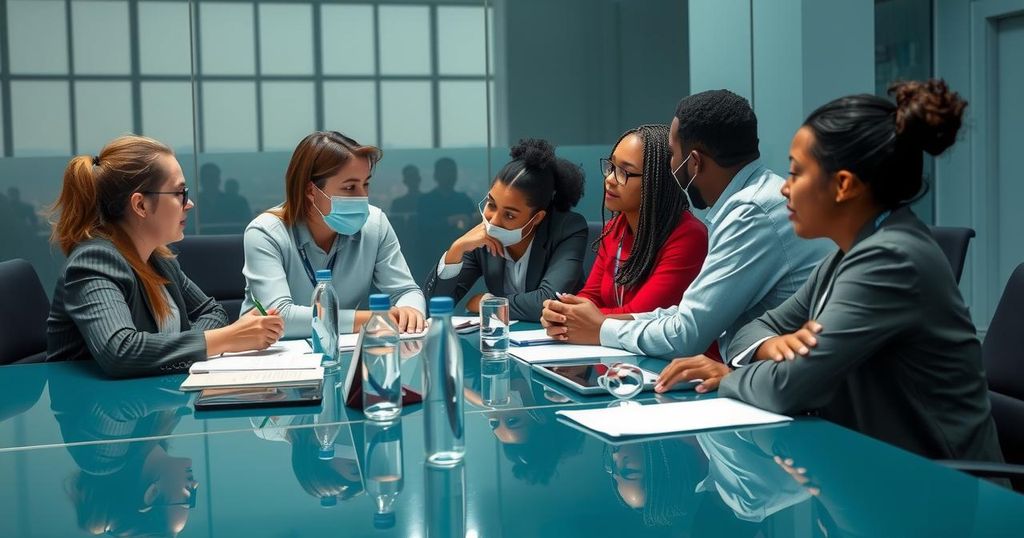Climate change
ACTION FILM & TV, ARMENIA, ASIA, AZERBAIJAN, BAKU, CLIMATE CHANGE, CLIMATE JUSTICE, CLIMATE SCHOOL, COLOMBIA, ENVIRONMENTAL POLICY, EUROPE/ASIA, GLOBAL WARMING, INTERNATIONAL COOPERATION, MALAYSIA, NEW YORK CITY, POLICY, RUSSIA, SCHOOL OF THE ARTS, SOUTH AMERICA, UNFCCC
Fatima Khan
0 Comments
Reflections on COP29: The Imperative of Storytelling and Collaboration for Climate Action
The article reflects on the importance of COP29 in addressing climate change through storytelling and multidisciplinary collaboration. It highlights significant concerns voiced by students about climate impacts in their countries and the insufficient climate finance goals established at the conference. Emphasizing the need for engaging narratives, the text advocates for diverse stakeholders to unite in their efforts towards a sustainable future.
My recent journey to Baku, Azerbaijan, to attend COP29, the United Nations climate change conference, involved traversing over seven thousand miles. Upon my arrival, I was met with Baku’s iconic flame-shaped towers, indicative of its history as a Soviet Republic and current status as a significant oil economy. Over two weeks, the conference brought together over 60,000 global leaders, experts, and activists to deliberate on crucial climate issues, including finance, human migration, and the cultural narratives that can drive climate solutions.
As a member of the steering committee for the UNFCCC Entertainment & Culture for Climate Action Film & TV, I am committed to the intersection of storytelling and climate advocacy. My Climate School course, “Climatic Change: Storytelling Arts, Zeitgeist and Our Future,” engages a diverse group of students from various disciplines to explore and address complex climate challenges through innovative narrative techniques. We recognize that stories have the power to reshape societal norms and inspire action more effectively than traditional media.
My students express deep concerns about climate change’s impacts in their home countries, such as rising sea levels in Mexico and catastrophic flooding in Pakistan. Our discussions often touch on the stark realities faced by those in high carbon-emitting nations and those suffering from environmental crises. Personal experiences, such as the loss of a home due to extreme weather, illustrate the urgent need for narrative engagement in addressing climate change.
The 2015 Paris Agreement emphasizes empowering individuals to participate in climate action through education and public discourse. In our class, we analyze how storytelling can influence public perception towards climate issues, highlighting the role of popular culture in fostering understanding and human agency. During COP29, the phrase “climate as everything, everywhere, all at once” resonated throughout discussions, underscoring the interconnectedness of climate change and our lives.
At the event, I participated in “Knowledge Day,” focusing on climate mobility and the challenges of dignifying relocation for communities affected by climate change. Prominent discussions involved how local leaders can access actionable climate data. Additionally, we read Amitav Ghosh’s “The Great Derangement,” which critiques the political framing of climate change, juxtaposing the urgency of response needed in various regions.
Our class is also focused on addressing the pervasive “climate silence” in major film industries. Efforts to increase climate visibility in film lag behind extensive narratives promoted by fossil fuel interests. At COP29, I advocated for enhanced climate storytelling and the importance of radical collaboration—integrating diverse stakeholders in finding climate solutions. My students were particularly alarmed by the presence of numerous fossil fuel lobbyists at the conference, recognizing the need for authentic representations of climate issues in culture and media.
Leaders from vulnerable regions, particularly from the Pacific and Africa, passionately urged wealthier nations to take meaningful climate actions in negotiations that ultimately set a target goal for climate finance, although still considered insufficient for those at highest risk from climate impacts. Engaging with experts and community leaders throughout the conference reinforced the necessity of a multidisciplinary approach in combating climate change.
As students embark on their final projects, they combine climate science and cultural narratives to provoke meaningful dialogues about our future. The power of narrative, when harnessed effectively, can inform and guide collective actions toward a more secure environmental landscape—emphasizing collaboration across diverse sectors. The call to action is clear: we must unite as artists, citizens, and professionals to create compelling stories that envision a healthier and more sustainable future for all.
Overall, my reflections on COP29 illuminate the critical role that storytelling and radical collaboration play in addressing climate change, urging that all sectors leverage their strengths to forge connections, share knowledge, and drive transformational change for our planet.
The article discusses the recent United Nations climate change conference (COP29) held in Baku, Azerbaijan, emphasizing the importance of multidisciplinary collaboration in tackling climate change. It highlights the role of storytelling in reshaping public perceptions and behaviors towards environmental issues, particularly through the lens of entertainment and culture. The article also critiques the insufficient climate finance goals reached during the conference and underscores the urgent need for empathetic narratives that can mobilize action against climate challenges. The significance of a global dialogue involving diverse stakeholders—including educators, artists, policymakers, and community representatives—is explored, as is the importance of empowering individuals with knowledge and resources to address climate vulnerabilities effectively.
In summary, COP29 stands as a crucial event that reinforced the need for radical collaboration across all sectors in addressing climate change. The power of storytelling as a tool for advocacy was highlighted, particularly in its capacity to inspire meaningful change and engagement in climate action. There remains an urgent necessity for diverse voices and perspectives, particularly from those most affected by climate disruptions, to shape the narratives that influence policy and societal norms. Uniting various fields, from arts to science, is essential for crafting a sustainable future, and fostering an environment where knowledge and imagination can transcend limitations.
Original Source: news.climate.columbia.edu




Post Comment